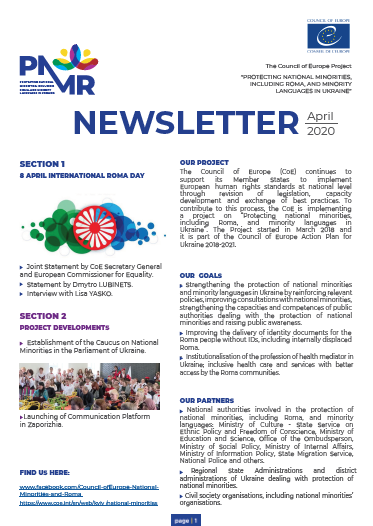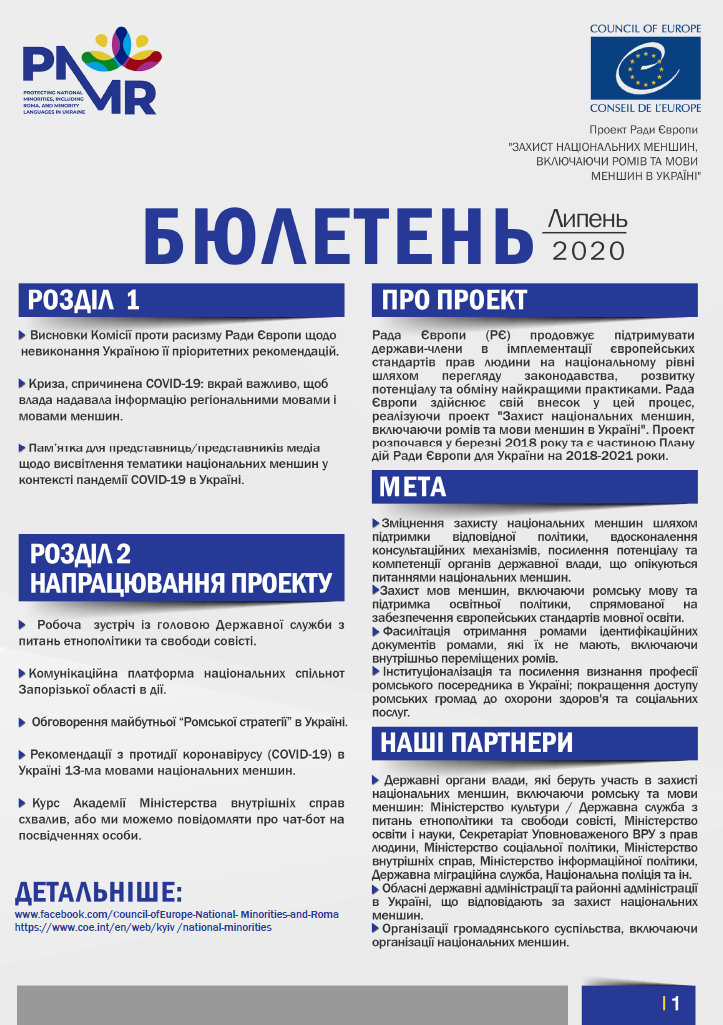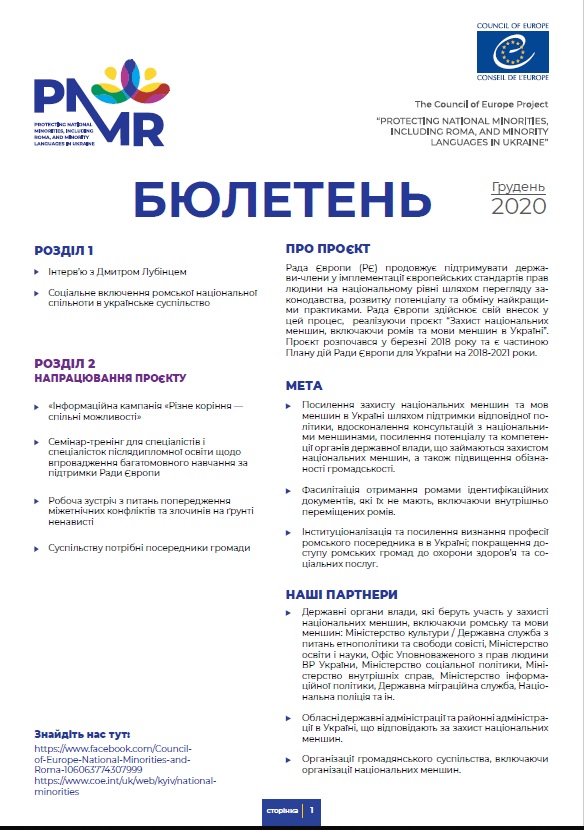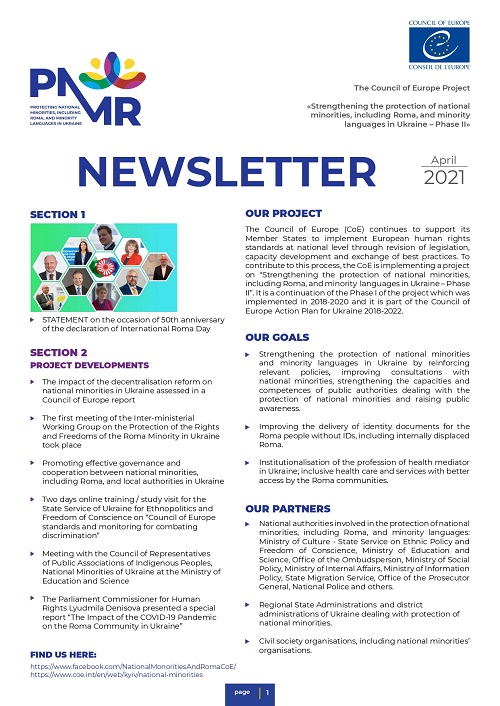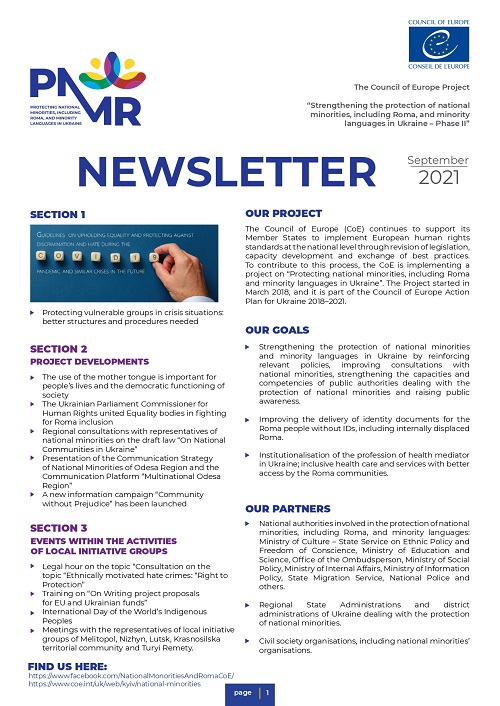The first discussion of the post 2020 Roma Inclusion Strategy was held online. The organisers of the event: Roma Programme of the International Renaissance Foundation in cooperation with the Council of Europe Project “Protecting National Minorities, Including Roma, and Minority Languages in Ukraine” and UN Women.
Work on the preparation of the draft Roma Strategy after 2020 in Ukraine has started. Under the conditions of quarantine restrictions, it was decided to conduct online meeting – to discuss the new Strategy and the Action Plan in order to effectively start the work in cooperation with representatives of the Ministry of Culture of Ukraine, representatives of Roma initiatives, organisations and expert community.
Earlier, all the participants willing to join the common efforts on behalf of Roma community, civil society organisations from various regions of Ukraine, were able to fill in an online application, thus announcing their intentions to contribute to the work on the new quality document that would meet the needs of Roma communities and take into account past experience.
Let us recall stages for creating a current Roma Strategy: on 8 April 2013, President of Ukraine issued a Decree on the Strategy for the protection and integration of the Roma national minority into Ukrainian society until 2020 (Roma Strategy) and instructed the Cabinet of Ministers of Ukraine to adopt the National Action Plan on its implementation. The respective Action Plan was approved on 11 September 2013, and the Ministry of Culture of Ukraine was put in charge of collecting information on Strategy implementation and reporting before the CMU. Roma Strategy is harmonised with the National Human Rights Strategy by 2020 and the corresponding Action Plan to implement the Strategy; their implementation is overseen by the Verkhovna Rada Committee on Human Rights, National Minorities and Interethnic Relations.
To strengthen the interagency coordination, the Government issued in 2015 a Resolution on Establishment of an Interagency Working Group on Coordination of Implementation of the Action Plan for the Roma Strategy which is headed by the Vice Prime Minister for Social Policy and his/her three deputies – Deputy Minister of Social Policy, Deputy Minister of Culture and a representative of civil society. Later on, the lnteragency Working Group established 5 sectoral sub-groups around the priority areas as defined in the Roma Strategy and the Action Plan.
The first discussion of the future document for the new period was organised on 13 May 2020 by the Roma Programme International Renaissance Foundation, UN Women and the Council of Europe Project “Protecting national minorities, including Roma, and minority languages in Ukraine” with the involvement of representatives of the Ministry of Culture and Information Policy of Ukraine.
The format of an online discussion enabled the participants to consider the main opposing aspects of several thematic documents and harmonise approaches to joint work.
Olha Tsviliy, the expert of the Council of Europe Project, presented directions for the new Roma Inclusion Strategy after 2021 in Ukraine. Discussion organisers called this document a “zero draft” designed not to direct the discussion into rigid boundaries, but to stimulate structured operation and discussion participated by representatives of Roma communities, Roma mediators and organisations, expert community and authorities alike. According to the official 2001 census, there are 47 587 Roma living in Ukraine. However, according to unofficial estimates of international and public organisations, the Roma population in Ukraine range from 200 000 to 400 000 people.
As described in the problem statement, despite the lack of reliable information on the number, social and demographic composition, and peculiarities of Roma population dispersion – a challenge that the all-Ukrainian population census must address – monitoring and evaluation studies conducted in 2013–2019, “Social Atlases” of Roma communities that were created for Kharkiv, Donetsk, Odesa and Zakarpattia Regions all point to the urgent need to focus on socio-economic and human rights difficulties faced by Roma, especially given the multiple forms of discrimination that Roma women and girls, disabled Roma, Roma with an IDP status face, as well as distinctions between Roma communities in Ukraine and within the communities in light of the regional context, social status, residence in the city, village or temporary settlements, cultural and religious differences. As stated in the document, the main challenges include the following:
- the need to increase attention to combating any form of discrimination, racism, violence and attacks on the ground of ethnicity;
- underage and young persons from Roma national minority have problems accessing general secondary, vocational and especially higher education, while adults have troubles accessing the system of overcoming illiteracy;
- under the conditions of decentralisation, there is a problem with housing and everyday financial matters, ensuring proper functioning of the housing infrastructure at the location of compact residence of people from Roma national minority, as well as the matter of issuing title deeds to housing and land plots;
- as of May 2020, especially considering the consequences of COVID-19 pandemic, the level of employment is low which leads to a decreased level of family income, increased social tension;
- insufficient level of Roma national minority representatives’ access to health care, including due to poverty;
- the need to resolve issues related to citizenship confirmation, issuance of identity documents, registration of domicile.
As noted by meeting participants, these issues are complex and reinforce each other creating for Roma children and communities the conditions where they cannot cope with complicated life circumstances they are facing. According to the expert, their solution requires a comprehensive approach based on the principles of intersectoral cooperation while actively involving Roma community representatives so that the solutions offered were enforceable.
Let us recall that in early April 2020, Dunja Mijatović, the Council of Europe Commissioner for Human Rights, stated that Roma still did not have access to clean water and sanitary conditions in many locations across Europe. Governments of some countries, like Slovakia, addressed the local authorities with a request to provide Roma with unlimited access to water. Another issue voiced by Ms Mijatović was access to medical care for people living in unofficial and isolated settlements which may cause difficulties to many Roma without identity documents, as well as to those without health insurance.
The new Roma Strategy after 2021 may contribute to resolving the specified issues in Ukraine. According to the document suggested during the webinar, the future Strategy goals and implementation tools may be based on the following key principles and foundations:
- respect for human rights and fighting discrimination;
- measurable goals and critical assessment – the definition of clear interim and final goals, tasks with their efficiency measurable and subject to assessment;
- the participatory process of policy development and decision-making;
- transparency and accountability;
- intercultural approach;
- using policies with proven efficiency.
The Strategy is expected to be implemented by 2026. Interim progress assessment indicators are to be monitored in 2022 and 2024. During the discussion, Serhiy Ponomariov, the Director of Roma Programme of the International Renaissance Foundation, presented main provisions of the framework Roma integration strategies (CoE, OSCE/ODIHR, EU) and basic provisions of the discussion between Roma organisations concerning the new strategy after 2020.
In addition, Hanna Herasymenko, Programme Analyst of UN Women Project, presented main conclusions and recommendations for the gender-responsible assessment of the National Strategy for the Protection and Integration of the Roma National Minority into the Ukrainian Society until 2020. The Strategy was assessed with support from the UN Women (as part of the Project “Gender equality at the centre of reforms, peace and security” funded by the Swedish Government), the Council of Europe Office in Ukraine and the Parliament Committee on Human Rights, National Minorities and Interethnic relations.
Its tasks included the provision of basic recommendations concerning the Roma Strategy after 2020 to ensure its compliance with international standards in the field of human rights, women’s rights and harmonisation with the national policy on gender equality, international and EU standards related to supporting and protecting national minorities and integrating Roma national minority; the availability of the institutional foundation for effective implementation and monitoring, as well as specific gender-sensitive measures aimed at addressing various needs of Roma women and men, girls and boys in Ukraine.
Thus, recommendations based on assessment results state that most stakeholders, both from the central and local institutions, as well as from the civil society, consider the Roma Strategy still relevant and necessary as a separate and comprehensive framework policy to address the issues of multiple discrimination, marginalisation and social exclusion that Roma women, men, girls and boys face.
The issues of vulnerable Roma women and men face are multiple and complex; they are interrelated and require targeted interagency response. If they remain just a part of the main programmes without a targeted policy, the impact on the integration of Roma women and men will decrease. As highlighted in the recommendations, the new Roma strategy must be guided by a comprehensive framework strategy, including the vision of desired social changes, clearly defined strategic goals and outputs, and consequently performance indicators while also providing the flexibility to determine the priority of local peculiarities and needs for impact measures in regional action plans.
Drawing on the experience gained, as well as on contextual changes, the content of the current Roma Strategy and Plan requires a serious revision with a focus on human rights and gender equality. Human rights, including the rights of Roma women and girls, must become a starting point in determining goals and outputs of the desired changes, as well as all measures that are expected to facilitate these changes. The full text of recommendations can be reviewed in the “Publications” section of the “Protecting national minorities, including Roma, and minority languages in Ukraine” project webpage at https://www.coe.int/uk/web/kyiv/project-publications-minorities
Participants of the first discussion of the post 2020 Roma Strategy included representatives of the Roma communities and organisations from various regions, Roma mediators, the Ministry of Culture and Information Policy in Ukraine, as well as Iryna Suslova, an adviser to the Chair of the Verkhovna Rada Committee on Human Rights, Deoccupation and Reintegration of Temporarily Occupied Territories in Donetsk, Luhansk Regions and Autonomous Republic of Crimea, National Minorities and Interethnic Relations. The meeting started with the welcoming speech by Galyna Meshcheryakova, Programme Coordinator of the UN Women Project “Gender equality at the centre of reforms, peace and security”, and Zemfira Kondur, Manager of the Council of Europe Project “Protecting national minorities, including Roma, and minority languages in Ukraine”.




